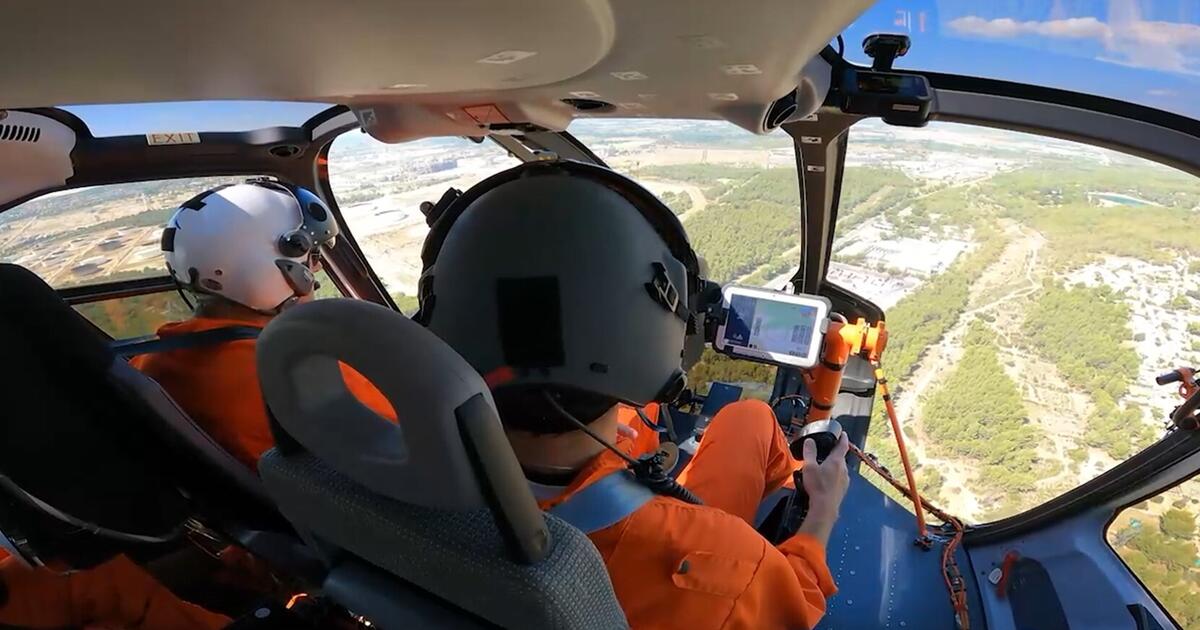Airbus Evaluates Flight Control System for CityAirbus NextGen eVTOL Aircraft
Airbus Helicopters' FlightLab has tested an electric flight control system as part of a new human-machine interface (HMI) for the Airbus CityAirbus NextGen eVTOL prototype. In a first for the helicopter industry, the system uses a single flight control stick to replace three-axis, conventional helicopter controls (cyclic, pedals, collective) to perform all aircraft maneuvers including takeoff and landing, climb, descent, acceleration, deceleration, turn, and approach.
The single stick takes up less space and offers improved pilot visibility. Combined with a revised HMI using simple displays, it provides information selection specifically tailored to eVTOLs.
Following this flight-test campaign, Airbus Helicopters will finalize system details and then conduct new tests within the Vertex project in partnership with the Airbus UpNext innovation ecosystem to advance autonomy by managing navigation and simplifying mission preparation.
“The advantage of an electric flight control system is enormous, especially when it comes to reducing pilot workload and ultimately enhancing mission safety," said Tomasz Krysinski, Airbus Helicopters’ head of research and innovation. "It is also a great example of how our demonstrators are used to mature the techno-bricks necessary to prepare the future of vertical flight.”
The FlightLab testbed is a modified H130 single-engine helicopter dedicated to maturing new technologies for the company’s current helicopters and future fixed-wing and eVTOL designs.
Massachusetts Gets First Airport Electric Charging Station
Local FBO Shoreline Aviation has partnered with eVTOL aircraft developer Beta Technologies to install an electric charging station for aircraft and ground vehicles. The public facility is the first of its kind in Massachusetts and is now in use at Marshfield Municipal Airport, halfway between Boston and Cape Cod.
Beta participated in the October 13 opening ceremony for the charging station by bringing its Alia 250 electric aircraft to Marshfield from its flight test center in Plattsburgh, New York, after a stop in Syracuse. The conventional takeoff and landing prototype vehicle is set to make a series of flights along the U.S. East Coast to get to Florida where it will participate in trials with the U.S. Air Force as part of its Afwerx research and development program.
The new station includes one Level 3 fast-charging unit on the airside for use primarily by electric aircraft and another in the parking lot for road vehicles. The installation also has a Level 2 charger for public ground vehicles.
The Massachusetts Department of Transportation’s Aeronautics department, which oversees 35 public-use airports, is promoting electric recharging. It recently secured a $2 million federal grant to help fund a smart microgrid at Cape Cod Gateway Airport.
MightyFly Builds Third-generation MF100 Cargo eVTOL Aircraft
MightyFly expects to complete the assembly of its third-generation MF100 hybrid-electric cargo eVTOL aircraft later this year. The San Francisco-based start-up is preparing to expand flight trials for the fully autonomous vehicle, with plans to conduct cargo delivery demonstrations in northeast Michigan in 2024.
The latest version of the MF100 features a larger cargo bay, measuring 72 by 19 by 18 inches that will have space for several items that might include cooler boxes containing organs for transplant, spare parts and tools for industrial customers, or consumer goods for retail deliveries. According to MightyFly, the aircraft will have a 100-pound payload and a range of 600 miles.
Flyvbird Commits To Buying Up to 50 of Eviation’s Alice Electric Aircraft
European regional airline start-up Flyvbird this week ratified an agreement with Eviation to acquire up to 50 of its nine-passenger Alice electric aircraft. The letter of intent covers an initial 25 of the fixed-wing model, plus options for 25 more.
Flyvbird is in the process of securing an air operator’s certificate. It aims to offer subregional scheduled services from smaller airports to connect European cities, starting in Germany where it is based.
The Alice is powered by a pair of MagniX 650 electric propulsion systems. The current status of development work is unclear with U.S.-based Eviation now targeting FAA Part 23 type certification in 2027.
Whisper Aero Seeks To Silence Leaf Blower Noise Nuisance
Whisper Aero is promising a quantum-leap reduction in aircraft noise with the electric propulsion system it is working on under wraps. But first, the U.S. start-up wants to solve another societal problem by quietening a common source of community irritation: leaf blower noise.
The Tennessee-based company’s engineering team has adapted an early example of the propulsors it is developing to be integrated into a leaf blower to assess how the technology might be applied to consumer products. It is seeking a partner to bring a leaf blower using its Whisper Drive technology to market.
According to Whisper Aero, its system could make leaf blowers 40 times quieter at a distance of 50 feet (16 dBA less), while generating 50 percent more airflow than current models and using 40 percent less energy. The hardware uses four- to five-inch-diameter fans made using injection molding techniques, and the company believes the same concept could be applied to equipment such as industrial fans, dryers, and dust-collection systems.
Energy Software Start-up Aerovy Close Pre-Seed Funding Round
Energy infrastructure software specialist Aerovy has raised $800,000 through a pre-seed funding round. The U.S. start-up is developing cloud-based software to support advanced air mobility providers in managing their electrical supplies and other aspects of operational management and is partnered with companies such as eSTOL aircraft developer Electro.Aero through its battery container subsidiary, Electro Base.
The funding round was led by venture capital group M25, along with Purdue Innovates, the John Martinson Entrepreneurship Fund, and the FlyWheel Fund. Aerovy said it plans to roll out new software products over the next 12 months, with deployments in locations including Perth in western Australia and Hokkaido, Japan.
